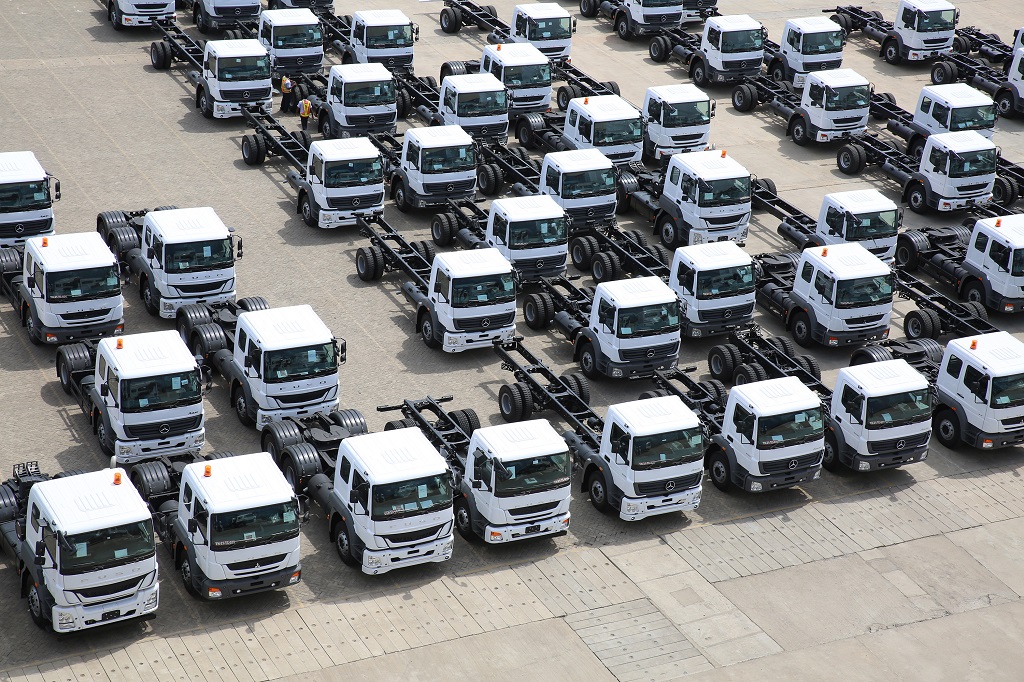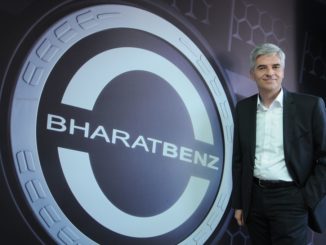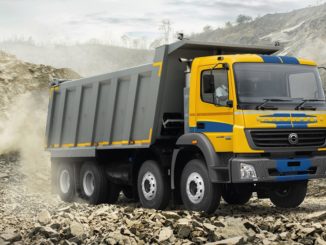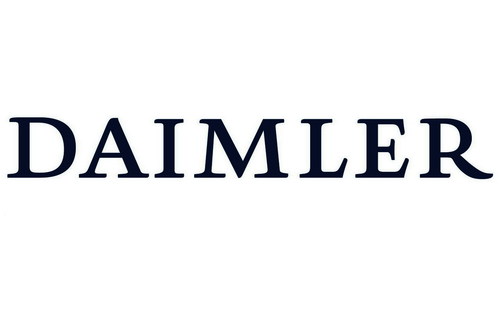- Steady growth of vehicle exports since start in June 2013, serving over 30 markets in Asia, the Middle East, Africa, and Latin America.
- Further markets to be added in 2017, to reach more than 40 by year-end.
Chennai – Daimler India Commercial Vehicles (DICV) celebrates the next important milestone in its export business. Less than four years after the kick-off, the 10,000th exports vehicle rolled onto the ship at Kamarajar Port near Chennai. The milestone vehicle, a Mercedes-Benz 40-ton heavy- duty tractor for a customer in Indonesia, is part of a batch of about 250 trucks on the way to various markets in South-East Asia.
Mr. Marc Llistosella, President and CEO of MFTBC and Head of Daimler Trucks Asia: “10,000 trucks exported are only a start. We are leveraging additional potentials in growth markets with reliable, efficient high-quality trucks built at our Indian manufacturing plant. There will be continuous significant growth in this business for our FUSO and Mercedes-Benz brands.”
DICV’s export product range, manufactured on the same production lines as its domestic BharatBenz portfolio according to global Daimler standards, features medium-duty (9-16 tonnes) and heavy-duty (16-49 tonnes) trucks. Developed and rigorously tested to meet the diverse requirements of the target markets in Asia, the Middle East, Africa, and Latin America, they are opening additional growth opportunities for Daimler Trucks – the world’s leading truck manufacturer with a global reach.
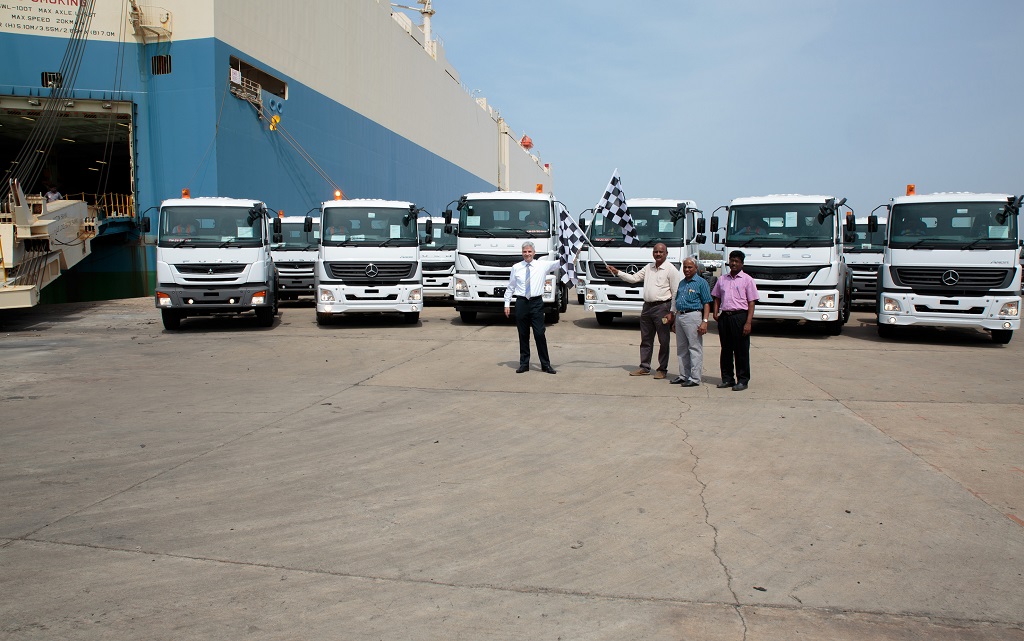
Mr. Erich Nesselhauf, Managing Director and CEO, Daimler India Commercial Vehicles said: “Our exports business has been developing extremely well. Since the launch in 2013, we have doubled our figures each year, and we aim for further significant growth as we will expand to serve more than 40 markets on three continents by the end of the year.”
With regard to the ‘Make in India’ initiative, Mr. Nesselhauf added: “Make in India works really well for manufacturers like us who can offer modern products and are able to meet international norms and customer expectations.”
Beyond completely built trucks, DICV has already exported more than 1,000 bus chassis produced at its bus plant and is ramping up volumes of its Mercedes-Benz school bus which has been launched in the Middle East. The company has also been supplying FUSO truck CKD kits to Kenya for local assembly by a FUSO partner in Kenya since March 2016, and to Daimler Truck’s production plant in East London/South Africa, where local assembly just began in May 2017.
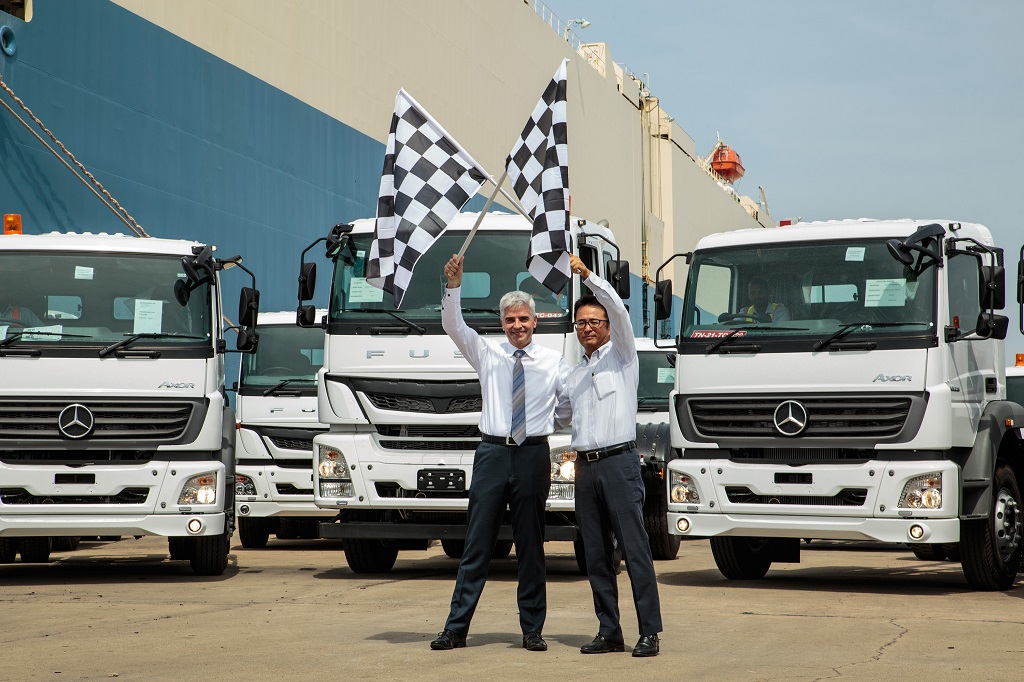
Daimler Trucks Asia at a Glance
Daimler Trucks Asia combines the strength of two distinct legal entities Daimler India Commercial Vehicles (DICV) and Mitsubishi Fuso Truck and Bus Corporation (MFTBC), collaborating on a range of topics ranging from product development, production and R&D to Sales & market development activities.
DICV at a Glance
Daimler India Commercial Vehicles (DICV) is a 100% subsidiary of Daimler AG, Stuttgart, Germany. DICV is a full-fledged commercial vehicle player in the Indian market. It currently produces and sells above 9 to 49 tons trucks for the Indian volume market, under the brand BharatBenz. BharatBenz stands for Indian engineering with German DNA. Under its bus division, the company produces and sells BharatBenz buses and Mercedes-Benz buses from its manufacturing plant at Oragadam. Bharat-Benz products have been engineered to serve all major customer segments with a focus on total-cost-of ownership, safety, reliability and comfort. Trucks including knocked-down vehicle kits as well as buses and bus chassis produced for the FUSO brand and the Mercedes-Benz brand are exported to more than 30 markets in the Middle East, Africa, Asia, and Latin America.
The state-of-the-art production plant at Oragadam near Chennai spreads over 400 acres (160 hectares) and was opened in 2012. The site is also home to DICV’s headquarters and R&D operations, and features a highly modern test track. DICV has made an overall investment of more than INR 5,000 crores. In August 2016, less than four years after the start of production, the milestone of 50,000 produced vehicles was crossed – an unprecedented ramp-up in the Indian commercial vehicle industry.
